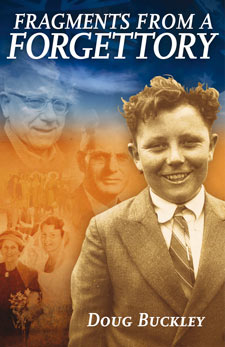Here's the short review: you should read this book.
Now to the longer version. I'll begin with why I could be wrong. Then I'll try to convince you to have a read.
I could be wrong because I'm biased. I know the Buckley family from St Stephen's Anglican church and youth group in Willoughby. Knowing that Doug is worth listening to might have papered over some of the frustrations with Fragments from a Forgettory.
 A second reason against: this is not great writing (sorry Doug!). It's sometimes too rambly and random. After over 470 pages, for example, it felt unfair and simplistic to find Doug's two reasons for the Germans causing World War II, "Martin's Luther's sense of Vocation; and the fact that theirs is a country lacking natural boundaries".
A second reason against: this is not great writing (sorry Doug!). It's sometimes too rambly and random. After over 470 pages, for example, it felt unfair and simplistic to find Doug's two reasons for the Germans causing World War II, "Martin's Luther's sense of Vocation; and the fact that theirs is a country lacking natural boundaries".
Doug's style here is conversational. It's a good idea, but doesn't quite work. What's more, there are plenty of errors in spelling and in fact. Here's an example: it was not Simon Crean but Bill Kelty who witnessed the Kirribilli agreement between Bob Hawke and Paul Keating.
But this leads to the first reason for picking up Fragments. Doug's interests are fascinating and diverse. You'll find Australian colonial history: the "latest' of Doug's ancestors to reach these shores arrived in the 1860s. There's a touch of industrial Australia in WWII and after. There's politics, especially that of the NSW Liberal Party (Doug is nearby at John Howard's preselection for a state seat). There's the life of an academic. There are the confessions of Doug as author. There's management of that 1970s behemoth, NSW's Public Transport Commission. Also, increasingly through the book, there are Doug's Christian musings on church, and on the Christian in society.
The second, and greater, reason for reading Fragments is that Doug shows us what it was like for him to be Christian. Fragments reflects on how theology should change Jesus' followers in all areas of life. Quoting Robert Banks, Doug suggest Fragments is really "a kind of case study or workbook' of a theology "of, by, and for the people'. What helped Doug was getting involved in the Zadok Centre.
Fragments does not demonstrate theology in its broad sense (who God is and how we know him). Its interest is more in ethics shaped by theology (as a Christian, how do I make decisions that affect many people?).
For instance, Doug decided that a Christian involved in transport management couldn't take responsibility for unemployment, even if his decisions caused some job losses. But he also considered it more loving to rely on staff resignations than large-scale redundancies. Doug's three criteria for public service were authority, stewardship, and justice.
There's bound to be something to provoke Christian reflection here. The fragments don't pretend to be from a perfect Christian life. They are from the kind of life we should be living " one in which we strive to practice the message of Jesus everywhere we go.























